|
|
|
Sort Order |
|
|
|
Items / Page
|
|
|
|
|
|
|
| Srl | Item |
| 1 |
ID:
128291
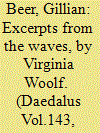

|
|
|
|
|
| Publication |
2014.
|
| Summary/Abstract |
Here is a hall where one pays money and goes in. where one hears music among somnolent people who have come here after lunch on a hot afternoon. We have eaten beef and pudding enough to live for a week without tasting food. Therefore we cluster like maggots on the back of something that will carry us on. Decorous, portly - we have white hair waved under our hats: slim shoes: little bags: clean-shaven cheeks: here and there a military moustache. not a speck of dust has been allowed to settle anywhere on our broadcloth. Swaying and opening programmes. with a few words of greeting to friends. we settle down. like walruses stranded on rocks. like heavy bodies incapable of waddling to the sea. hoping for a wave to lift us. but we are too heavy. and too much dry shingle lies between us and the sea. We lie gorged with food, torpid in the heat. Then. swollen but contained in slippery satin. the sea-green woman comes to our rescue. She sucks in her lips. assumes an air of intensity. in?ates herself and hurls herself precisely at the right moment as if she saw an apple and her voice was the arrow into the note. 'Ah !' "An axe has split a tree to the core: the core is
warm: sound quivers within the bark. 'Ab.' cried a woman to her lover, leaning from her window in Venice. 'Ah. Ah !' she cried. and again she cries 'Ah !' She has provided us with a cry. But only a cry. And what is a cry? Then the beetle-shaped men come with their violins: wait; count; nod; down come their bows. And there is ripple and laughter like the dance of olive trees and their myriad-tongued grey
|
|
|
|
|
|
|
|
|
|
|
|
|
|
|
|
| 2 |
ID:
128299
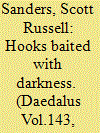

|
|
|
|
|
| Publication |
2014.
|
| Summary/Abstract |
I first read Walden when l was seventeen. the summer before starting college. at the urging of a high school teacher who sensed that my adolescent mind. brimming with questions, would bene?t from grappling with a truly radical thinker. Much of the book baf?ed me. The tone shifted unpredictably from conversational to prophetic, from jokey to stem, from earthy to mystical. I was bewildered by some of the lengthy sentences, which zigvagged among ideas and images. and l was stumped by the cryptic short ones. which seemed to compress whole paragraphs of meaning into a few words. Not yet having made any big decisions about how to lead my life, I couldn't ?gure out what was troubling this Henry David Thoreau. So what if his neighbors
thought he should use his Harvard degree to land a job and a wife, and then proceed to have kids, buy a
house. get rich. and distribute aims to the poor? Couldn't he just ignore the scolds and go his own way? Not yet having lost a loved one to accident. illness. or old age, I only dimly understood his brood- ing about that amoral process we call nature. So what if armies of red ants and black ants slaugh- tered one another, herons gobbled tadpoles, a dead horse stank up the woods, or a thousand seeds per- ished for each one that took root? What did all that mayhem and waste have to do with us, the owners of souls aiming at heaven ?
|
|
|
|
|
|
|
|
|
|
|
|
|
|
|
|
| 3 |
ID:
128294
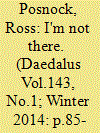

|
|
|
|
|
| Publication |
2014.
|
| Summary/Abstract |
Perhaps, like me. you have a propensity to collect books without quite knowing why. Over the years I have piled up books by and about, say, Ludwig Witt- genstein, Hannah Arendt, George Santayana, Philip Roth, Ad Reinhardt, Philip Guston, Franz Rosen- zweig, Penelope Fitzgerald, Thomas Bernhard - and not only not read them, but have no desire to do so. I have kept busy working on other things. And for a decade or two at a time. these texts simply gather dust on my shelves. But then, inevitably. I am drawn to these nearly forgotten volumes and. strangely, they prove pivotal to a new project: l recall. for instance, that Santayana ascended, literally, from the obscurity of a low shelf to earn a chapter in my book on William and Henry James. Wittgenstein made an analogous, if more circuitous, journey from the shadows, waiting untouched, until five years ago when I kept a long-held inner vow to read an- other languishing tome, one that had stared me down so often it had acquired an aura of intimidation: Stanley Cavell's The Claim of Reason: Wittgen-stein, Skeptirism, Morality and Tragedy. It was indeed intimidating. but also inspiring: that experience opened the door to more Cavell - and to deeper engagements with Emerson - and to Wittgenstein, who has joined the sage of Concord as a central ?gure in my current project on writers. artists. and philosophers who renounce their careers. The peculiarities of this manner of book buying - the absence of full consciousness and the long gap between acquisition and reading - puts me in mind
|
|
|
|
|
|
|
|
|
|
|
|
|
|
|
|
| 4 |
ID:
128295
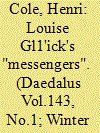

|
|
|
|
|
| Publication |
2014.
|
| Summary/Abstract |
You have only to wait, they will find you. The geese ?ying low over the marsh, glittering in black water. They find you. And the deer - how beautiful they are. as though their bodies did not impede them. Slowly they drift into the open through bronze panels of sunlight. Why would they stand so still if they were not waiting? Almost motionless, until their cages rust, the shrubs shiver in the wind. squat and lea?ess. You have only to let it happen: that cry - release, release - like the moon wrenched out of earth and rising full in its circle of arrows until they come before you like dead things. saddled with ?esh. and you above them. wounded and dominant.
|
|
|
|
|
|
|
|
|
|
|
|
|
|
|
|
| 5 |
ID:
128471
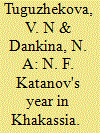

|
|
|
|
|
| Publication |
2013.
|
| Summary/Abstract |
This article is devoted to the description and analysis of scientific events held in Khakassia in connection with the celebration of 150"' birth anniversary of the Khakass scholar, Turkologist, orientalist, Doctor of comparative philology Nickolay Fyodorovich Katanov: an international scientific conference, popularizing the scholar's heritage, collecting and publishing his works. According to the Government decree of the Republic of Khakassia, the year 2012 was declared as Khakass scholar Nickolay Fyodorovich Katanov's Year in Khakassia. In thirteen countries more, which are members of international organization of Turkic culture, the year 2012 was declared as outstanding orientalist, Turkologist N. F. Katanov's Year.
|
|
|
|
|
|
|
|
|
|
|
|
|
|
|
|
| 6 |
ID:
128470
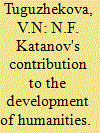

|
|
|
|
|
| Publication |
2013.
|
| Summary/Abstract |
Professor N. F. Katanov has been one of the famous and outstanding national scholars and thinkers of Russian science, education and culture at .the turn of nineteenth and early twentieth century} Scientific and
pedagogic activity of N. F. Katanov is multidimensional. Famous Russian Turkologist G. I. Iskhakov wrote: "Turkologist-orientalists O. N. Blhtlingk, M. A. CastrEn, V. V. Radloff, I. N. Berezin and others_laid the foundation of oriental studies in Russia, then Professor N. F. Katanov enriched this science with new data in the sphere of linguistics, history, archaeology and ethnography through his self-sacrificing work, scrupulous I investigation and long-term research of a language and oriental peoples' ' culture. And, therefore, he got into the line of biggest world scholars"? In oriental studies N. F. Katanov is famous as a scholar encyclopedist having wide interests - language, literature, folklore, history, archaeology, ethnography, numismatology, museology. His scientific interest was not only in history and culture of the Turkic-speaking peoples but also in the Slavonic, Ugro-Finnic, Chinese, Japanese, Arabic, Persian, Indian peoples. He could speak almost all the European languages, many oriental languages, knew also petrified and dead classic languages, read Turkic runes, Sumerian wedge writing, Egyptian and Chinese hieroglyphs, Sanskrit writing, Arabic ligatured script, Old Uyghur and Aramaic ' graphics ?uently". N. F. Katanov's biographers report that he used the data of 114 world languages in his works.'
|
|
|
|
|
|
|
|
|
|
|
|
|
|
|
|
| 7 |
ID:
128293
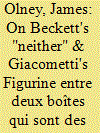

|
|
|
|
|
| Publication |
2014.
|
| Summary/Abstract |
I am very grateful to the editors of lkrdalm for per mitting and even encouraging me to select two works - Samuel Beckett's "neither" and Alberto Giacometti's sculpture Figurine entre deux boites qui
sont des maisons - for my discussion of influence. As I have been associated with literature departments throughout my career, I have chosen Beckett's for my primary text. But while I believe that what I want to say could be said from that work alone. I also believe that it will be more forceful, more convincing. and surely more graphic if I couple "neither" with Giacometti's Figurine. And as artists. Beckett and Giacometti had. in the ?nal analysis. so much in common that when we read. as a summary judgment of a whole body of work. that "he is one of the few artists who has contributed fundamentally to the way the human condition is perceived," no one unfamiliar with the statement could say with any assurance which artist is its subject.
|
|
|
|
|
|
|
|
|
|
|
|
|
|
|
|
| 8 |
ID:
128300
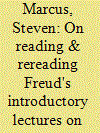

|
|
|
|
|
| Publication |
2014.
|
| Summary/Abstract |
I am going at least at first to write autobiographically. My justification for doing so is that I regard my experience as relatively typical and hence as bearing some fraction of non-negligible, if perhaps oblique, interest. I first read Freud sixty-?ve years ago. I was eighteen years old, and the occasion arose in what was then offered in my intellectually conservative college as a new course. The subject was in the humanities. and it consisted of works selected from some of the many masters of mid- nineteenth- and early-twentieth-century literature and thought. Included among them were such ?gures as Melville, Flaubert. Dostoevsky, Nietzsche. Henry and William James, George Bernard Shaw, I). H. Lawrence. Joyce, Proust, and Kafka. Inserted some- where in the second half of the chronological list was Freud's Introductory Lectures on Psychoanalysis, which he originally delivered between 1915 and 1917.' Hence the context in which Freud was pre- sented, and presented himself, to my largely bewildered late-adolescent sensibility was that of Western cultural, intellectual, and literary modernism. It was an advantage, I believe, to have read him for the first time among other immensely distinguished minds, writers who were in the course of radically departing from what had been generally accepted as canonical forms, conceptions, and conventions of representation - and of norms and values. including the values of civilization and of life itself.
|
|
|
|
|
|
|
|
|
|
|
|
|
|
|
|
| 9 |
ID:
128292
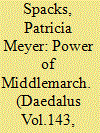

|
|
|
|
|
| Publication |
2014.
|
| Summary/Abstract |
Dorothea's eyes followed her husband anxiously. while he sank down wearily at the end of a sofa, and
resting his elbow supported his head and looked on the floor. A little flushed, and with bright eyes, she
seated herself beside him, and said "Forgive me for speaking so hastily to you this morning. I was wrong. I fear I hurt you and made the day more burdensome." "I am glad that you feel that, my dear," said Mr. Casaubon. He spoke quietly and bowed his head a little, but there was still an uneasy feeling in his eyes
as he looked at her. "But you do forgive me?" said Dorothea, with a quick sob. In her need for some manifestation of feeling she was ready to exaggerate her own fault. Would not love see returning penitence afar off , and fall on its neck and kiss it? "My dear Dorothea - 'who with repentance is not satis?ed. is not of heaven nor earth:'- you do not think me worthy to be banished by that severe sen- tence." said Mr. C asaubon. exerting himself to make a strong statement. and also to smile faintly. Dorothea was silent. but a tear which had come up with the sob would insist on falling. "You are excited, my dear. And I also am feeling some unpleasant consequences of too much mental disturbance." said Mr. Casaubon. In fact, he had it
in his thought to tell her that she ought not to have received young Ladislaw in his absence: but he abstained. partly from the sense that it would be un-gracious to bring a new complaint in the moment
|
|
|
|
|
|
|
|
|
|
|
|
|
|
|
|
| 10 |
ID:
131578


|
|
|
|
|
| Publication |
2014.
|
| Summary/Abstract |
When I was in graduate school, in the 1980s, one frequently heard complaints about the comparatively unsophisticated nature of the historiography of the medieval Middle East. There was considerable envy of historians in fields like early modern European history, who pushed broader disciplinary limits and whose works were read not just for content but also for historiographical and theoretical inspiration. There were some in our own corner of the profession blazing new methodological trails-Clifford Geertz, for example, who, though not a historian, had much to say to historians, and whose books were read eagerly by historians, and not just in Middle Eastern history; or Fedwa Malti-Douglas, as much at home in feminist literary theory as in medieval Arabic literature. But many graduate students in Middle Eastern history felt a bit underrepresented on the cutting edge of historical thought and practice.
|
|
|
|
|
|
|
|
|
|
|
|
|
|
|
|
|
|
|
|
|